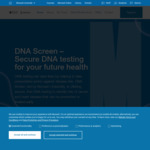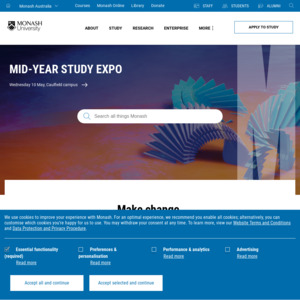DNA testing can save lives by helping to take preventative action against disease risk. DNA Screen, led by Monash University, is offering secure, free DNA testing to identify risk of cancer and heart disease that can be prevented or treated early.
One in 75 Australians have one of these DNA variants, but many don’t know it. DNA Screen is offering 10,000 18 to 40-year-olds across Australia a free DNA test to look for variants that increase the risk of some cancers or heart disease.
A saliva sample, collected simply at home, is all the test requires.
The world-first DNA Screen pilot study is funded by the Federal Government and led by Monash University, in collaboration with institutions and researchers from around Australia. Personal data collected by the study is private and confidential.


DNA test results do not affect private health insurance in Australia. However, DNA results can be used by life insurance companies at the time of underwriting risk-rated policies (e.g. death, income protection, and permanent disability insurance). This is only relevant if you wish to apply for such policies after undertaking DNA testing.